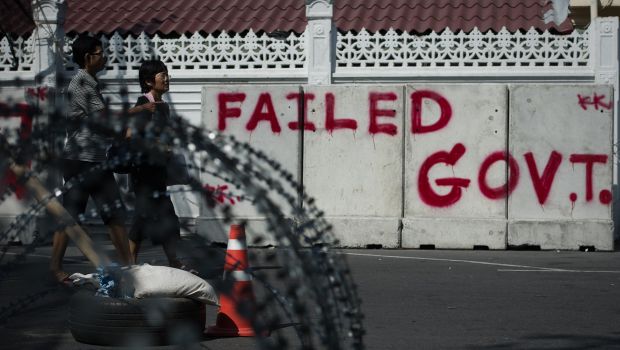
Thai anti-government protesters walk outside the Government house in Bangkok on January 12, 2014 (AFP PHOTO/ Nicolas ASFOURI)
Supporters of Prime Minister Yingluck Shinawatra were rallying in her defense on Sunday but steered clear of Bangkok, where people went about their business as normal.
The anti-government protesters accuse Yingluck and her brother, former premier Thaksin Shinawatra, of corruption and nepotism.
She has called an election for Feb. 2 but protesters want her caretaker government to step down immediately.
Protest leader Suthep Thaugsuban ruled out talks with the government in an interview published on Sunday but said he would stand down his movement if, as some fear, violence escalates and civil war looms.
“If it becomes a civil war, I will give up. People’s life is precious for me,” he was reported as saying by the English-language Sunday Nation. “If someone instigates a civil war, I will tell the people to go home.”
The eight-year conflict pits Bangkok’s middle class and royalist establishment against the mostly poorer, rural supporters of Yingluck and Thaksin, who was overthrown in a military coup in 2006.
Their Puea Thai Party seems likely to win any new election, which the government says must be held on Feb. 2 now parliament has been dissolved and the date endorsed by the king.
However, a member of the Election Commission said on Saturday the vote could be held on May 4, arguing that was permissible under the constitution because candidates had been prevented from registering in some districts, meaning there would be no quorum to open parliament after a February poll.
Eight people, including two police officers, have been killed and scores injured in violence between protesters, police and government supporters in recent weeks.
Police said seven people were wounded early on Saturday when gunmen fired at anti-government protesters in central Bangkok near Khao San Road, a popular tourist area.
Fears of clashes between rival factions escalated after pro-government “red shirts” said they would begin their own rallies from Sunday in provinces neighboring Bangkok and in a northeastern stronghold, Udon Thani, where leaders said they expected 10,000 people by Monday.
Ministers told a briefing on Sunday that 12,000 police would be deployed to maintain law and order in Bangkok, along with 8,000 soldiers at government offices.
“We don’t want confrontation with the protesters…In some places we will let them into government buildings,” Foreign Minister Surapong Tovichakchaikul said.
“The government will let Suthep play the hero tomorrow…It will be his show,” added Labor Minister Chalerm Yoobamrung.
“There won’t be a repeat of 2010 because the government will not use that strategy. There are no plans to use force,” he said, referring to an army crackdown on Thaksin supporters that year when more than 90 died including police and soldiers.
The unrest has hurt tourism and further delayed huge infrastructure projects that had been expected to support the economy this year at a time when exports remain weak. Consumer confidence is at a two-year low.
Many believe the army could step in to break the political deadlock, especially if the protests turn more violent.
The army has staged or attempted 18 coups in 81 years of on-off democracy but has tried to remain neutral this time.
“I want to tell all sides they must not clash with each other … We are all Thais and can live together despite our differences,” army chief Prayuth Chan-ocha said on Saturday.
The protesters plan to block seven big intersections in Bangkok, causing gridlock in a city clogged with traffic at the best of times, and they could shut off other roads.
Surapong said on Friday the US embassy was alarmist to advise its citizens to get in two weeks’ supply of food and water.
Some residents have been stocking up on food and other essentials, but retailers have not experienced the kind of panic buying seen, for example, during floods that threatened to overwhelm Bangkok in 2011.
City officials have told 140 schools to close on Monday and universities near the seven protest sites will suspend classes.
